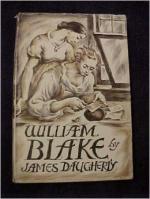|
This section contains 5,455 words (approx. 19 pages at 300 words per page) |

|
SOURCE: "Criticism and the Experience of Blake's Milton" in Studies in English Literature 1500-1900, Vol. 30, No. 4, Autumn, 1990, pp. 555-71.
Youngquist is an American educator and the author of Madness and Blake's Myth. In the following psychoanalytic interpretation of Milton, he asserts that the poem is about "the ordeal of experiencing and mastering a pathological distortion of consciousness."
I cannot deny that there is truth in prophecies.
—Herodotus
William Blake's Milton, for all its grandeur, presents interpreters with a formidable task. Although praised as "a poem worthy of a place beside the Book of Job and Paradise Regained" [Harold Bloom, Blake's Apocalypse, 1963], it resists easy explication and lacks the cultural status of those comparable works. In the effort to understand Milton, critics have approached it from a variety of angles, interrogating its systematic symbolism, innovative narrative, or critique of metaphysics. But still the poem awaits a criticism adequate to...
|
This section contains 5,455 words (approx. 19 pages at 300 words per page) |

|


